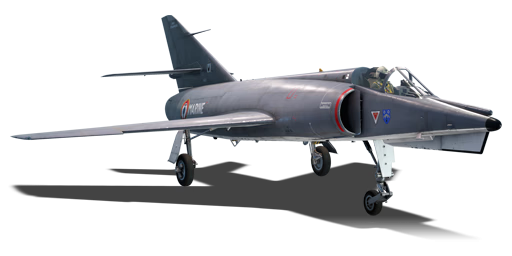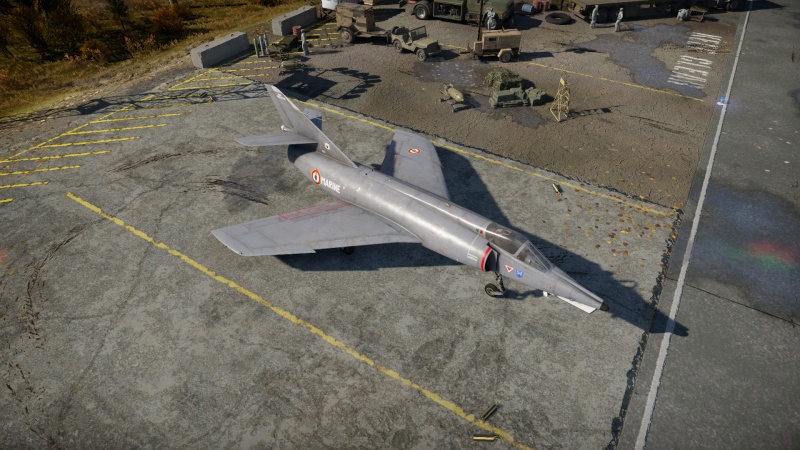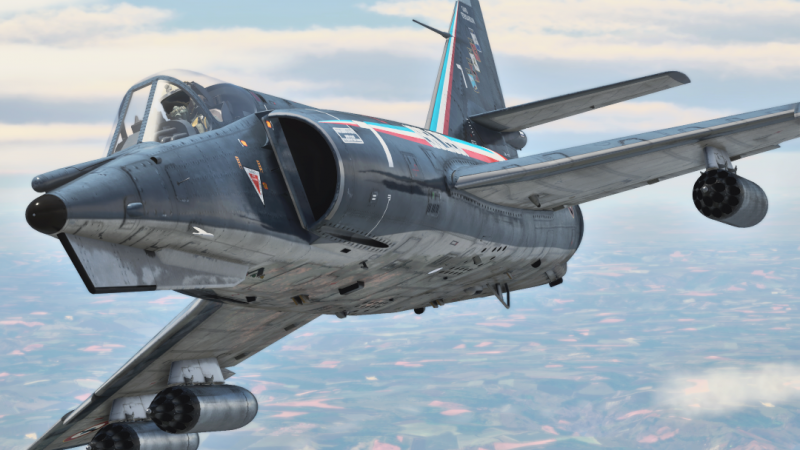Difference between revisions of "Etendard IVM"
Colok76286 (talk | contribs) (→Media: Updated WT Live link) |
m (Preemptively Linking Art) |
||
| Line 1: | Line 1: | ||
{{Specs-Card | {{Specs-Card | ||
|code=etndard_4m | |code=etndard_4m | ||
| − | |images={{Specs-Card-Image|GarageImage_{{PAGENAME}}.jpg}} | + | |images={{Specs-Card-Image|GarageImage_{{PAGENAME}}.jpg|ArtImage_{{PAGENAME}}.png}} |
}} | }} | ||
Revision as of 02:47, 13 September 2021
Contents
Description
The Etendard IVM is a rank VI French strike aircraft with a battle rating of 9.3 (AB/SB) and 9.0 (RB). It was introduced in Update 1.95 "Northern Wind".
General info
Flight performance
The Etendard has good acceleration up to 1050 km/h, after which the aircraft tends to have a very difficult time accelerating. Manoeuvrability is acceptable when above 800 km/h - not great, but not bad. However, dipping below 800 km/h causes the aircraft to lose much of its turning ability, and energy retention is quite poor at all speeds. The aircraft has a good rate of climb compared to its counterparts.
| Characteristics | Max Speed (km/h at 0 m - sea level) |
Max altitude (metres) |
Turn time (seconds) |
Rate of climb (metres/second) |
Take-off run (metres) | |||
|---|---|---|---|---|---|---|---|---|
| AB | RB | AB | RB | AB | RB | |||
| Stock | 1,085 | 1,076 | 13000 | 32.7 | 33.5 | 79.4 | 74.2 | 800 |
| Upgraded | 1,114 | 1,100 | 31.5 | 32.0 | 112.3 | 95.0 | ||
Details
| Features | |||||
|---|---|---|---|---|---|
| Combat flaps | Take-off flaps | Landing flaps | Air brakes | Arrestor gear | Drogue chute |
| ✓ | ✓ | ✓ | ✓ | ✓ | ✓ |
| Limits | ||||||
|---|---|---|---|---|---|---|
| Wings (km/h) | Gear (km/h) | Flaps (km/h) | Max Static G | |||
| Combat | Take-off | Landing | + | - | ||
| 0 | 426 | 1,300 | 389 | 389 | ~11 | ~4 |
| Optimal velocities (km/h) | |||
|---|---|---|---|
| Ailerons | Rudder | Elevators | Radiator |
| < 920 | < 750 | < 600 | N/A |
Engine performance
| Engine | Aircraft mass | ||||||
|---|---|---|---|---|---|---|---|
| Engine name | Number | Empty mass | Wing loading (full fuel) | ||||
| SNECMA Atar 8C2 | 1 | 3,385 kg | 320 kg/m2 | ||||
| Engine characteristics | Mass with fuel (no weapons load) | Max Takeoff Weight | |||||
| Weight (each) | Type | 11m fuel | 20m fuel | 30m fuel | 38m fuel | ||
| 950 kg | Axial-flow turbojet | 7,228 kg | 7,848 kg | 8,537 kg | 9,088 kg | 10,950 kg | |
| Maximum engine thrust @ 0 m (RB / SB) | Thrust to weight ratio @ 0 m (100%) | ||||||
| Condition | 100% | WEP | 11m fuel | 20m fuel | 30m fuel | 38m fuel | MTOW |
| Stationary | 4,075 kgf | N/A | 0.56 | 0.52 | 0.48 | 0.45 | 0.37 |
| Optimal | 5,688 kgf (750 - 900 km/h) |
N/A | 0.79 | 0.72 | 0.67 | 0.63 | 0.52 |
Survivability and armour
- Side walls have a 14 mm steel plate
- Front firewall has a 14 mm steel plate
- Bulletproof glass is only installed down the center window of 40 mm
Modifications and economy
Armaments
Suspended armament
The Etendard IVM can be outfitted with the following ordnance:
- 2 x 30 mm DEFA 552 cannons (120 rpg = 240 total)
- 2 x 30 mm DEFA 552 cannons + 4 x 500 lb AN-M64A1 bombs (2,000 lb total)
- 2 x 30 mm DEFA 552 cannons + 2 x 1,000 lb LDGP Mk 83 bombs (2,000 lb total)
- 2 x AS-20 Nord missiles
- 2 x AS-30 Nord missiles
- 2 x 30 mm DEFA 552 cannons + 72 x SNEB type 23 rockets
- 2 x 30 mm DEFA 552 cannons + 2 x AIM-9B Sidewinder missiles
- 2 x 30 mm DEFA 552 cannons + 36 x SNEB type 23 rockets + 2 x 500 lb AN-M64A1 bombs (1,000 lb total)
- 2 x 30 mm DEFA 552 cannons + 2 x AIM-9B Sidewinder missiles + 2 x 500 lb AN-M64A1 bombs (1,000 lb total)
- 2 x 30 mm DEFA 552 cannons + 2 x AIM-9B Sidewinder missiles + 36 x SNEB type 23 rockets
Usage in battles
Although it does not have an afterburner, the Etendard has a very competitive TWR and acceleration, thanks to its light weight and powerful engine. It also has a good climb rate, decent turn rate, and a fairly standard set of armaments. However, like many French jets at its tier, it tends to have poor energy retention, and any manoeuvring tends drastically reduce acceleration. This means that a turnfighting play-style is often difficult, and defensive flying is hard to do successfully- the player should avoid gaining a tail if at all possible.
As such, the aircraft's good climbing ability and acceleration make it better suited for a more passive boom and zoom play style, where it is unlikely that an enemy will be able to chase it down. Such a playstyle will require teamwork. The Etendard is by no means a solo carry, and diving in and out of furballs to support teammates is often necessary. In this play style, the player will be easily able to keep a speed above 800 km/h (below which the aircraft's manoeuvrability suffers greatly).
The Etendard has two 30 mm cannons mounted on the bottom side of the aircraft. This can throw off many players' aim, and the only way to resolve this issue is through practice. The aircraft's air-to-air missiles, while less able to lock and track enemies than missiles mounted by other aircraft at the tier, can be very effective against slow targets and unmanoeuvrable bombers such as the B-57 or the Tu-14T.
Pros and cons
Pros:
- Good acceleration and climb rate
- Strong cannons and ground-attack capability
- Carrier take-off results in a higher starting speed than a land takeoff
- Better energy retention than the Super Mystere B2
Cons:
- Often uptiered, forcing the plane to face difficult opponents
- Has fewer air-to-air missiles than other jets at its rank
- Limited ammunition and small payload
- Poor low-speed manoeuvrability
- Lacks a Ballistic Computer or Radar, limiting its attack effectiveness
History
The Dassault Etendard was developed from an aircraft initially intended for the French Air Force to participate in the competition for the best ground attack aircraft capable of operating from makeshift runways.
This design was not chosen by NATO, which preferred the Fiat G.91. The French Air Force also did not want it and preferred to wait until the end of the development of the Mirage III. However, the prototype built for the French Air Force caught the attention of the Navy, which requested a navalised prototype in 1956.
A new engine was then added to it: the Atar 8 (Atar 9 without afterburner); an in-flight refuelling probe; new high lift devices; a new fuselage with a larger wing area; foldable wing tips; a new reinforced structure to support catapult launches and landings; and finally, an enlarged nose cone to fit the new Aida radar for aerial and ground target acquisition. In addition, a SAAB AX 26 toss-bombing and ballistic computer was incorporated into the design. 5 pre-production airframes were ordered by the French Navy in May 1957. On May 21, 1958, at Melun Villaroche, Jean-Marie Saget took charge of the plane. The Etendard flew as fast as the Super Mystere B2 despite not having an afterburner.
Dassault would produce 90 copies in Mérignac (not counting the prototypes). From the Etendard IVM no.1 to no.69, deliveries were made from December 1961 to May 1965.
The Etendard IVM was gradually withdrawn from service from 1978, due to the introduction of the Super Etendard.
Media
- Skins
- Videos
See also
- Aircraft of comparable role, configuration and era
External links
- [Wikipedia] Dassault Étendard IV
- [Air Vectors] The Dassault Etendard & Super Etendard
- [Dassault Aviation] Etendard
Template:AirManufacturer Bloch
| France jet aircraft | |
|---|---|
| Fighters | M.D.450B Ouragan · M.D.450B Barougan · M.D.452 IIA · M.D.452 IIC · Mystere IVA · Super Mystere B2 |
| ▄F-86K · ▄F-100D · ▄F-8E(FN) | |
| Mirage IIIC · Mirage IIIE · Milan · Mirage 5F · Mirage 2000C-S4 · Mirage 2000C-S5 · Mirage 2000-5F · Mirage 4000 | |
| Mirage F1C · Mirage F1C-200 · Mirage F1CT | |
| Strike aircraft | ▄F-84F · F-84F IAF · ▄F-84G-26-RE |
| Etendard IVM · Super Etendard · Alpha Jet E | |
| Jaguar A · Jaguar E · Mirage 2000D-R1 · Mirage 2000D-RMV | |
| Bombers | S.O.4050 Vautour IIA · Vautour IIA IDF/AF · S.O.4050 Vautour IIB · S.O.4050 Vautour IIN · S.O.4050 Vautour IIN (late) |
| Belgium | ▄Meteor F Mk.8 · ▄Mirage 5BA · ▄F-104G · ▄F-16A · ▄F-16AM |
| Netherlands | ◘Sea Hawk Mk.50 · ◘Hunter F.6 |






